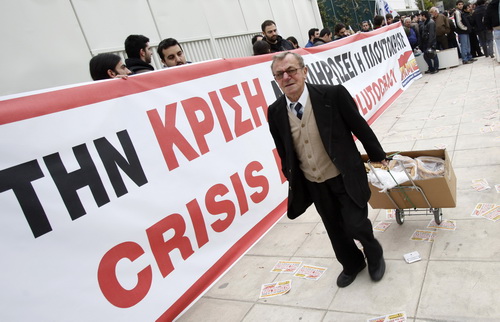World Business
Is a wider bailout needed?
By Simon Kennedy and Emma Ross-Thomas (China Daily)
Updated: 2010-04-29 10:31
 |
Large Medium Small |
Cut in Greek bond rating to junk ramps up borrowing costs
PARIS - Europe's worsening debt crisis is intensifying pressure on policymakers to widen a bailout package beyond Greece after a cut in the nation's rating to junk drove up borrowing costs from Italy to Portugal and Ireland.
As German Chancellor Angela Merkel delays approval of a 45 billion-euro ($59 billion) Greek rescue, the crisis is spreading. Portugal's benchmark stock index on Tuesday fell the most since the aftermath of Lehman Brothers Holdings Inc's collapse, while the extra yield that investors demand to hold Italian and Irish debt over bunds remained near Tuesday's 10-month high.
 |
|
A pedestrian walks past a protest outside the Athens stock exchange. [Agencies] |
The danger for European officials is that the fiscal turmoil which started six months ago with fudged Greek budget data will spin out of their control. As Greece waits for its euro-region partners to disperse funds, the European Union has announced no concrete plans to help other nations should aid be needed. The euro weakened to the lowest in a year on Tuesday.
"Policymakers need to get ahead of the curve," Eric Fine, who manages Van's Eck's G-175 Strategies emerging-market hedge fund. "This is no longer a problem about Greece or Portugal, but about the euro system."
Governments will hold a summit by around May 10 to discuss Greece, EU President Herman Van Rompuy said in Tokyo.
"Negotiations are going on and they are well on track and there is no question about the restructuring of the debt," he said at a press conference.
The spread on Italy's debt fell 1.3 basis points to 114.4 from 115.7 on Tuesday after the ratings cut, the highest since July. Portugal's PSI-20 stock index dropped 5.6 percent, the most since October 2008. The yield on two-year Greek notes surged to more than 23 percent on Wednesday, and the nation's securities regulator imposed a two-month ban on short sales on the Athens stock exchange.
Erik Nielsen, chief European economist at Goldman Sachs Group Inc, said the Athens talks were likely focused on assistance in the first year of between 55 billion euro and 75 billion euros.
"I suspect that some haggling is now going on between the IMF and the Europeans on the burden sharing of a bigger program," he said.
"Investors should focus on the conditionality attached because that's what will determine the sustainability of the program."













